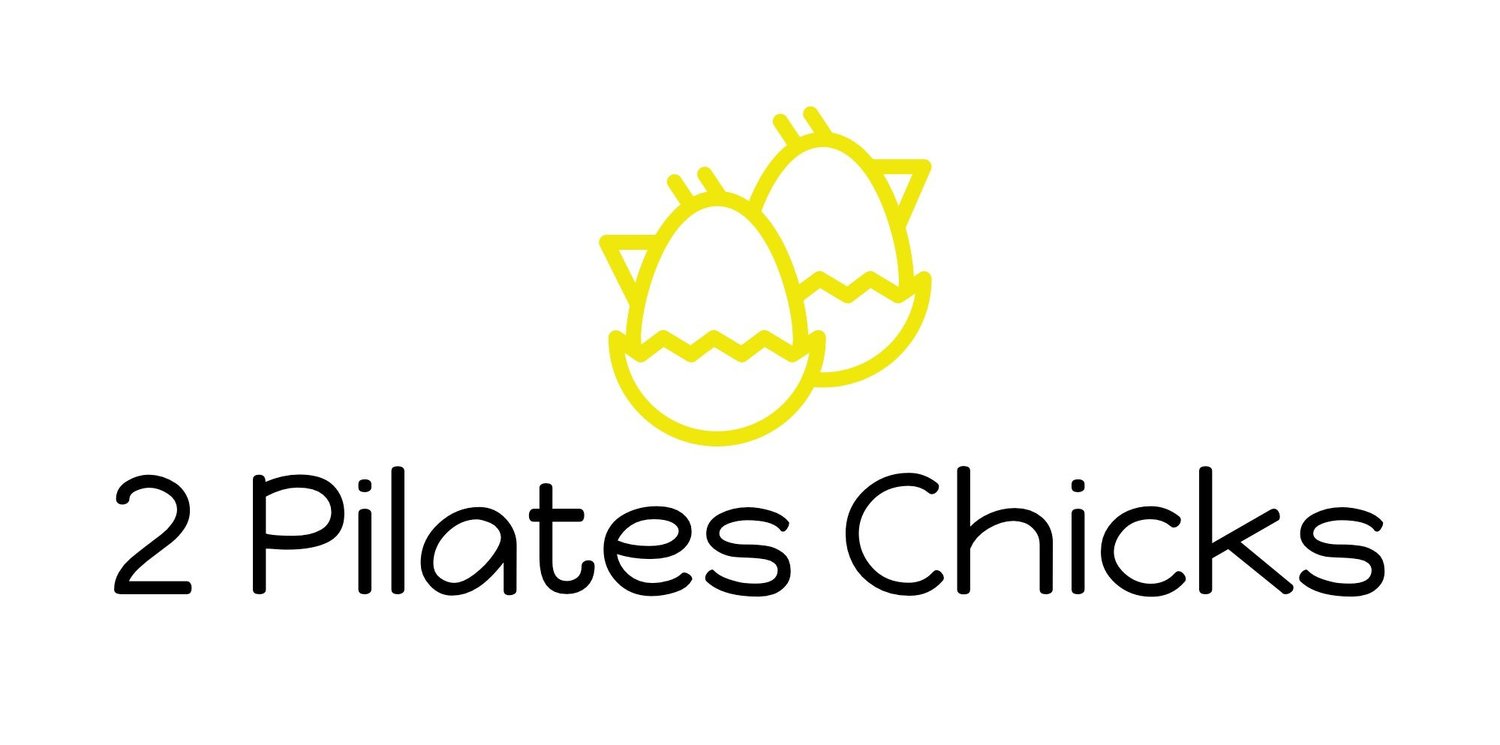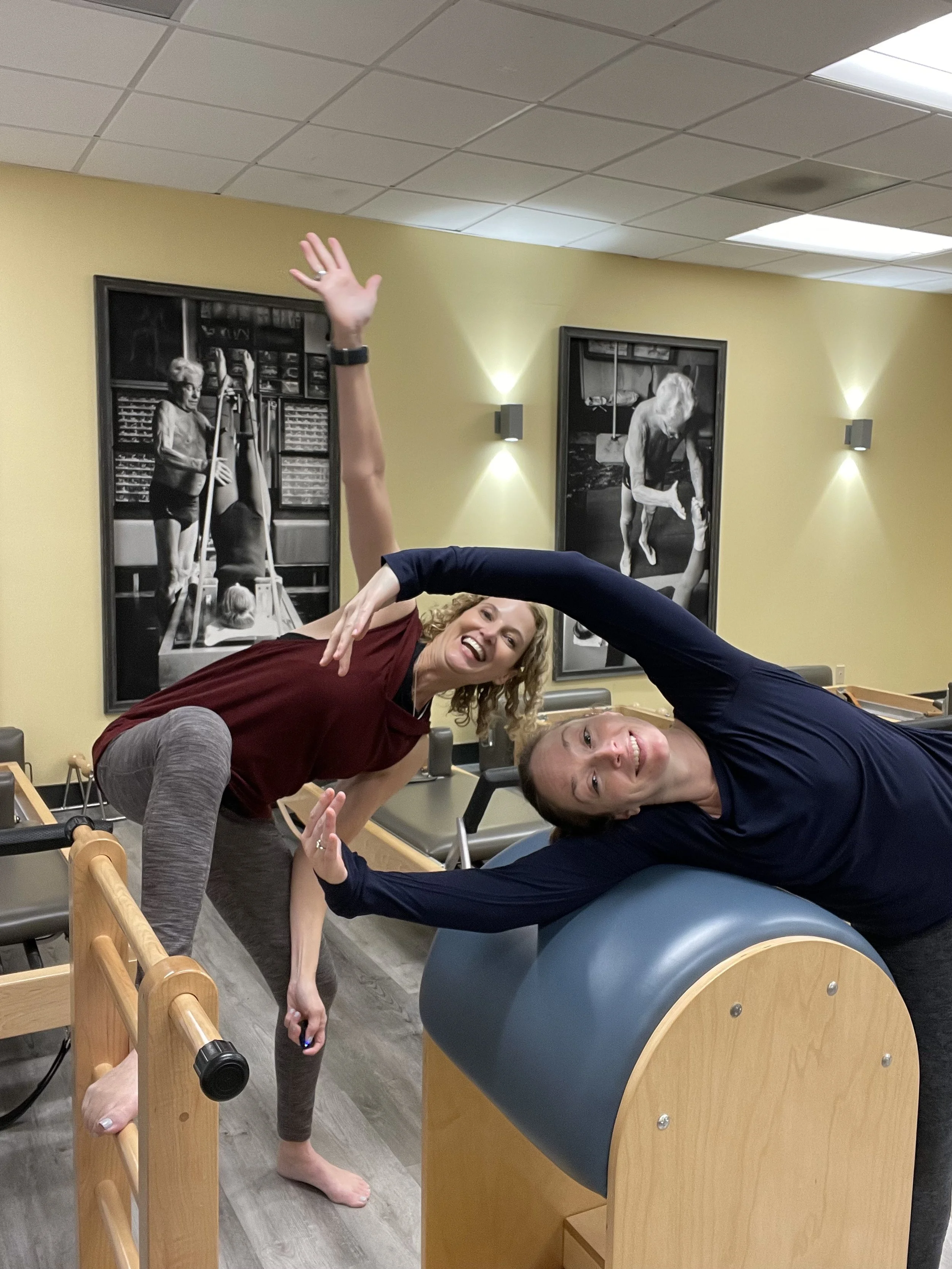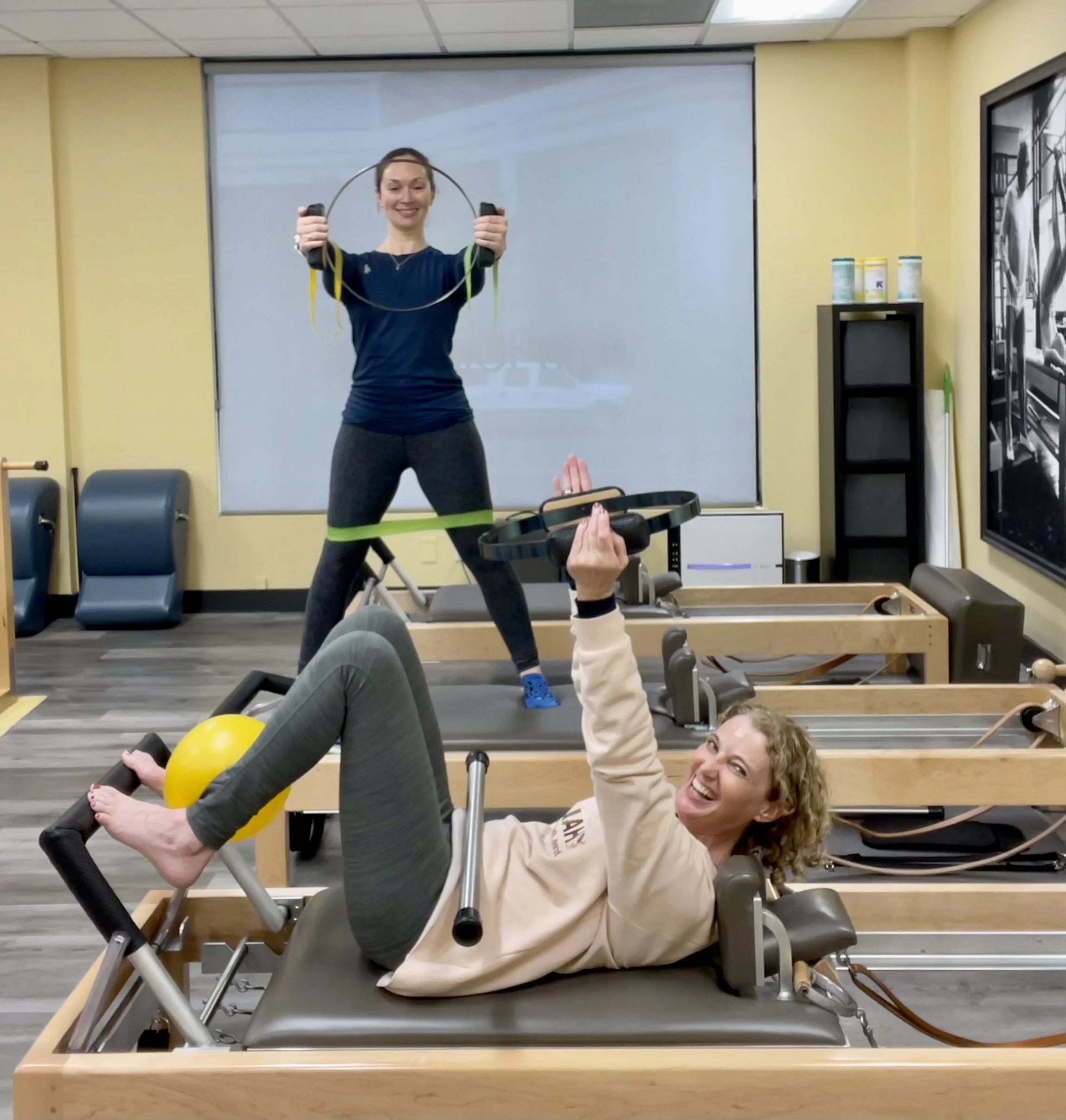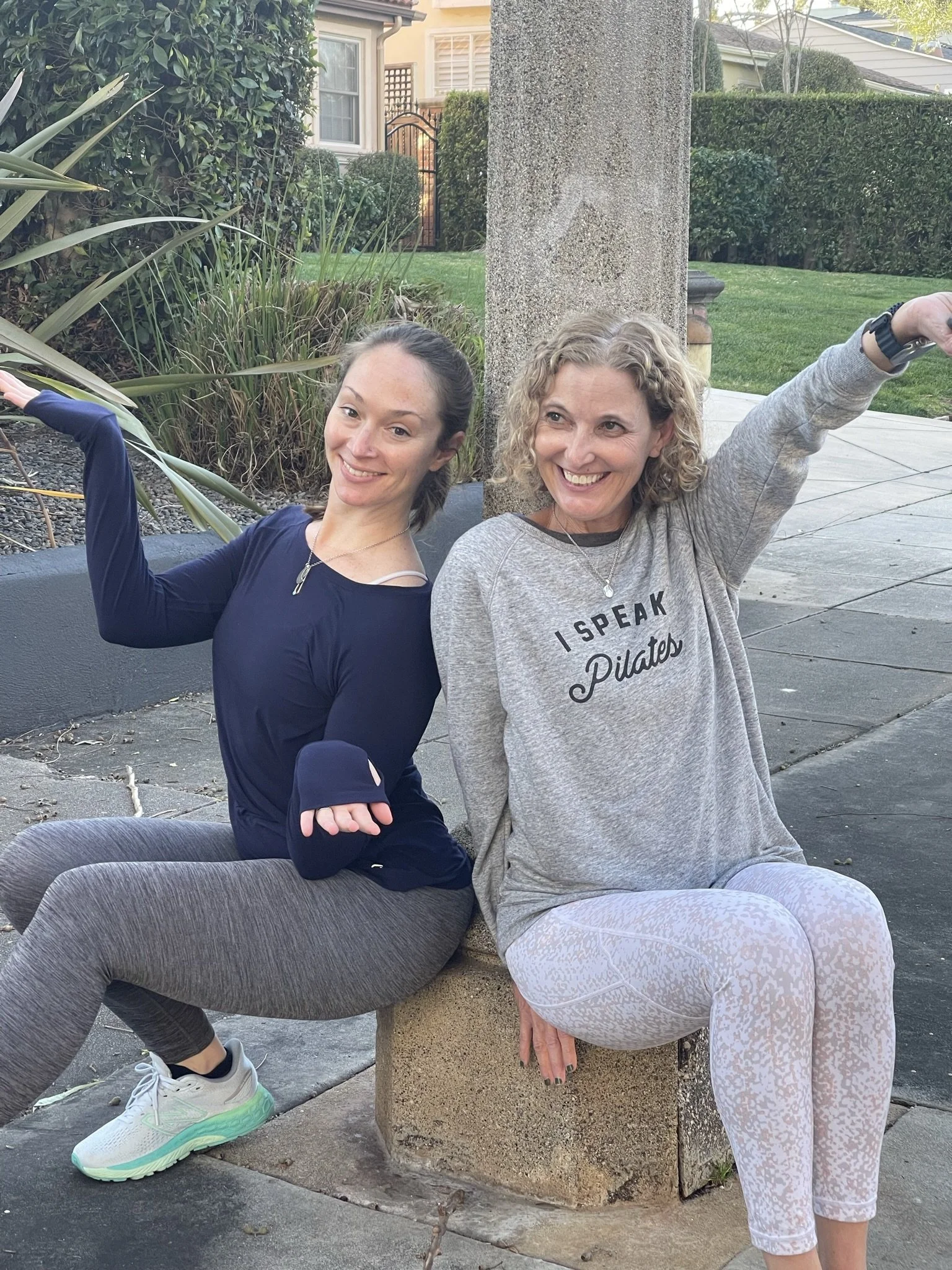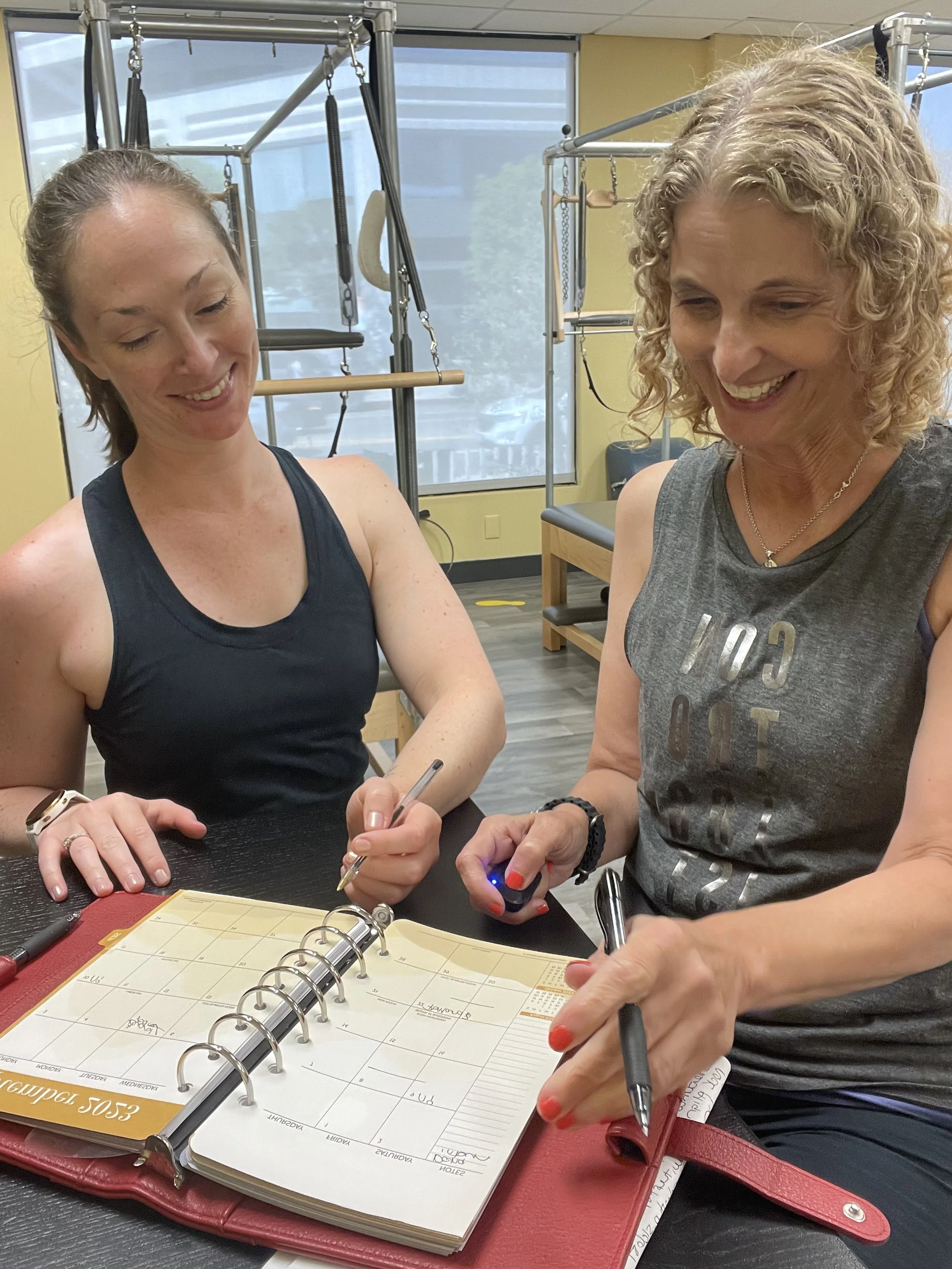Tips for Dealing with that "I'm Bored" Client
What do you do if your client looks at you and says “I am bored” in the middle of their Pilates session? Do you panic as a Pilates teacher if a client says “I don’t feel challenged”? Do you look at your Pilates client and worry that they are bored and you need to do something “exciting” so they aren’t bored or don't get bored? How do you handle that client that says to you “I am bored" or "I want to do [that thing] I saw on social media”?
In our podcast "Working with the Bored Client" we continue our conversations on the psychology of clients and different personalities. In this episode we discuss the bored client, figuring out why they might say they're bored, how to give them deeper work without constantly throwing new exercises at them, and how we can stay calm in the moment of being told they're bored.
When we're sharing our practice with our client it can feel quite upsetting to be criticized or have a client give negative feedback. It is, however, important to be able to handle constructive criticism and be able to receive feedback, and then move forward to continue developing our practice. As we adapt to our client's needs and expectations, we continue to grow as teachers while our clients develop their practices, and we can then maintain clients for many years without feeling "bored".
So, how do we handle a situation when a client exclaims that they are bored in their session, or that Pilates is boring to them? As we mentioned, that type of critical statement feels very harsh. At that moment we can feel like we were punched in the gut and our internal dialogue starts telling us we're bad teachers, we're going to lose a client, we're awful at this career… Just like in any challenging situation, it's important to take a moment to breathe. There is always space between a stimulus and our response, and the trick is to be able to find that moment to slow down and recenter ourselves instead of quickly reacting.
While this can feel personal, it is generally not about us, the teacher, but more often about the client and what is going on internally for them.
Here are some things we can ask ourselves in these moments:
1. Is the client really connecting to what we're saying? Is this client focused with each exercise in their session OR are they just moving through and not focused on what they are doing?
2. Is their mind on other things? Do they tend to stop moving to chat? or chat while moving?
3. Do they not really want to work? When you try to push them do they sigh, grumble and give up?
4. Are they actually in it with you? Are they listening with intent or just assuming they know what you are asking and going off ahead of what you're cueing?
5. Why are they there? Are they wanting you to do the work for them?
While hearing a statement like "I'm bored", from a client feels hurtful, if we are able to give ourselves a moment of pause we can think about why the client may be saying this. At this moment we need to remember it's likely not about us. The client has their own baggage that they're carrying in with them. When they're in the studio with us, what can we do to help them connect to the work, leave their bags at the door and be present with us in their practice?
Sometimes a client will blatantly come out and say they're bored, while sometimes they just have a blank look and appear so, while other times we're simply putting out our own fear as a Pilates teacher that our client is bored or will become bored with us and the work. Whichever the situation is, we must remember Pilates isn't just about what we're doing, but how we're doing it. It's always about the specific body in front of us in that particular session.
We can check in with ourselves and our clients to make sure we're doing everything we can for this individual's needs. We can look at what the client is coming to us with, pain, fear of movement, expectations, or perfectionism, to try to understand from the client's perspective why they might feel or say that they're bored.
Maybe they're not connecting 100%, not focused in the room with us. Often, they're thinking about other things even though they think they're in it, just pressing in and out on that footbar. Sometimes they do need to just move without too much thought and we can allow them to move through many repetitions of an exercise that day. But, if they are always just bouncing around on the reformer, not putting effort in, how do we as the teachers get the client more engaged? We know that the more we focus on Pilates, the more challenging it will be.
Are we teaching to this person's level, and are we connecting to their interests/goals/unique learning needs? There are many variables we can change in order to give more variety to the client's sessions without having to just pick lots of different exercises to try to keep them entertained. We're not teaching them to keep them entertained, but we do want to help them engage with the work as best they can.
Some of these variables include pace, duration, flow, variations of movement, transitions, and tempo. We can cue them up to the moment of an exercise where they tend to get lost and then ask them to hold there instead of powering through, bumping them up to their edge of control. There are many options to change up exercises instead of just always floundering around for new exercises to stay interesting. Instead, give the client consistency and then change the flow/pace, getting them deeper into the movement. In this way, they'll be more challenged in the long run, rather than constantly throwing something new at them, which will then eventually become routine where we end up back to them feeling bored.
Bored clients often are the ones who really don’t want to put the effort in. They want us to “do the work” by giving them exercises that look hard or that they have seen on social media, but we might not be able to give these exercises as the client hasn't connected in their body in the proper way to set up for that specific exercise or achieved the strength or endurance necessary as they aren’t putting in the necessary effort. The client may also have an old injury or pathology that prevents them from doing a fancy-looking exercise that they think seems fun.
This is the client that can benefit from the classical/traditional transitions as they move through the Mat and Reformer work so they have no moment to rest or to think as they are kept consistently moving and flowing from one exercise to the other. With no moment to stop and fling the body down in exhaustion, they are going through the full hour non-stop. In this way, they don’t even have time to think about anything other than the movement, much less that they're bored.
We need to remember when we are teaching these “bored” clients that we can't continue endlessly putting all of our energy into their workouts. It is exhausting for the teacher to have to pull, push and drag the client around when they are giving nothing back.
Getting a bored client to engage, focus and meet us at least halfway what needs to happen? Maybe the client simply doesn't want to put the effort in even though they say they want to be more challenged. Some people hate to exercise and don’t want to be in the studio with us. At some point, the client needs to meet us at the work and we can't pull clients along if they're not trying or if they don't want to be there. Occasionally, there is a client who thinks they're bored but doesn't want to put in the work, and they're simply not going to try. Then it's not on the teacher if we're trying to meet them but they won't meet us. We can't do the work for them. We need to get this client “in the work”, meaning they will have to meet us at some point and actually do the work as much as we're working to guide them.
There's also the instance when the teacher puts the fear of the bored client on themselves when it doesn't even come from the client themselves. In this situation when we put our own fear of the clients getting bored on ourselves, we're creating more anxiety and pressure on ourselves. Many teachers deal with imposter syndrome, and the fear that they don't know enough and their clients will get bored and leave.
When you allow yourselves to believe that, you might give the client exercises that they're not ready for, throwing anything and everything at them to keep them interested. It's important to remember that while we're in the studio anywhere from 10-40 hours each week, our clients are only there 1, 2, or maybe 3 hours a week. We might feel like we're repeating ourselves and are boring because we're there all day, every day, but for the clients, this hour or two each week in the studio is new for them. It's their time to focus on themselves, chat with us, learn more about Pilates, be challenged physically, and have some time for their wellness journey.
Sometimes, we get into a bit of a rut in our careers, and we feel like we're just dialing it in, going through the motions without trying or putting in any deeper level of thought. Everyone goes through days like that, but if it's constant we might be hitting some burnout and need a break to refresh and reinvigorate our own practice. If we're bored teaching, likely our client is bored too. But if we're asking the client to really focus on something in particular then we're also more focused on guiding them, and it's more interesting for everyone.
By stating "I'm bored", the bored client may expect new, fun, challenging exercises they see on social media, but as the expert and teacher if we know it doesn't work for that person, what else can we do? Tell them," let's focus on x throughout the whole class, and then do a challenge point at the end that we've been building up to". This challenge can be something they've done a bunch of times but we might change a variation of it, and tune them into something specific that we've been guiding them to focus on. Something as simple as saying: "today we are going to a challenging point of [insert exercise here], so keep that in mind and connect with [insert cue here] as we move through your session".
It definitely feels awful when a client tells us they're bored, but we can try to take a moment to breathe, staying centered and calm in the moment they tell us this, trying not to take it personally, and then find the variations that we might be able to utilize to add a new dynamic to this client's sessions. This can be a moment both for the teacher and the client to grow and deepen their understanding.
For the bored client, the most important thing we can do is try to give them focus, presenting them with something to really dive into so they don't feel lost or disconnected. We can also ask the client, what is it that's making you not feel challenged, or what do you feel like you're missing?
We can also ask ourselves if are we teaching to their level, do we need to pick the pace up, include more coordination, change the support or lack of to make it more challenging, slow things down to make them hold positions longer, or maybe add in more transitions to reduce pauses between the exercises. We can use all these ideas to be more creative instead of always throwing in new routines or extreme, novel exercises.
When we look into the real reason a client might say they are bored, try not to take it personally, but take a moment and think “what is missing for this client”. Realize in some way they are lost and we need to change some variables to get them to reconnect with their practice, using the tools we know to help them find their engagement and focus. The minute all that happens suddenly a load is lifted off us, as the client reconnects and recommits to their own work.
Overall, as with any new situation, our goal is to stay centered and calm in the moment, not taking clients' statements personally, and thinking about the things we can change for the client as needed. Sometimes, however, it's just who that person is, and there's nothing we need to fix or change for them. And in that case, we can just learn to let go as best we can.
